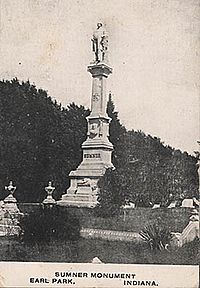Sumner Monument (Earl Park, Indiana) facts for kids
Quick facts for kids Sumner Monument |
|
|---|---|
 |
|
| Artist | Unknown |
| Year | 1882 |
| Type | Granite or Marble |
| Dimensions | 210 cm × 110 cm × 91 cm (84 in × 42 in × 36 in) |
| Location | Sumner Cemetery, Earl Park, Indiana, United States |
| 40°40′31.5″N 87°25′20.9″W / 40.675417°N 87.422472°W | |
| Owner | Sumner Cemetery Association |
The Sumner Monument is a special statue found in the Sumner Cemetery in Earl Park, Indiana, USA. It was finished in 1882. This monument is the burial place for Edward C. Sumner, an important early settler and a rich cattle farmer from Indiana, and his wife, Abigail Sumner. We don't know who created this monument.
Contents
What the Monument Looks Like
The monument is a large base, called a pedestal. It is made from either granite or marble. Some records say it's marble, but others say it's granite.
On top of this pedestal stands a statue of Edward C. Sumner. He is wearing clothes from the 1800s. His left elbow rests on a tree stump covered with vines. His right hand is in his pocket.
Details of the Sculpture
On the side of the pedestal, there is a carved image of his wife, Abigail Sumner. This type of carving, where the image sticks out from the surface, is called a relief bust. The entire monument stands 22 feet tall.
At the front of the base, there is an inscription that says: LSC/SUMNER.
A wooden sign near the monument shares more information:
- SUMNER CEMETERY
- EDWARD C. SUMNER 1811-1882
- A NOTED INDIANA CATTLE BARON
- PURCHASED TOPENEEBEE'S RESERVE
- IN 1846, EXTENDED HOLDINGS TO
- 36,000 ACRES. SUMNER, IN STONE,
- COMTEMPLATES WHAT HE IN LIFE
- ONCE OWNED.
How the Monument Was Made
The stone for the monument, whether granite or marble, was brought all the way from New York. Building this large sculpture cost $10,000. It was completed in 1882. The carved image of Abigail Sumner was finished around the time Edward Sumner passed away. However, it was not shown to the public until after she also died.
Condition of the Monument
In 1993, experts checked the monument as part of a program called Save Outdoor Sculpture! They said the monument was "well maintained," meaning it was in good shape.
 | Emma Amos |
 | Edward Mitchell Bannister |
 | Larry D. Alexander |
 | Ernie Barnes |

